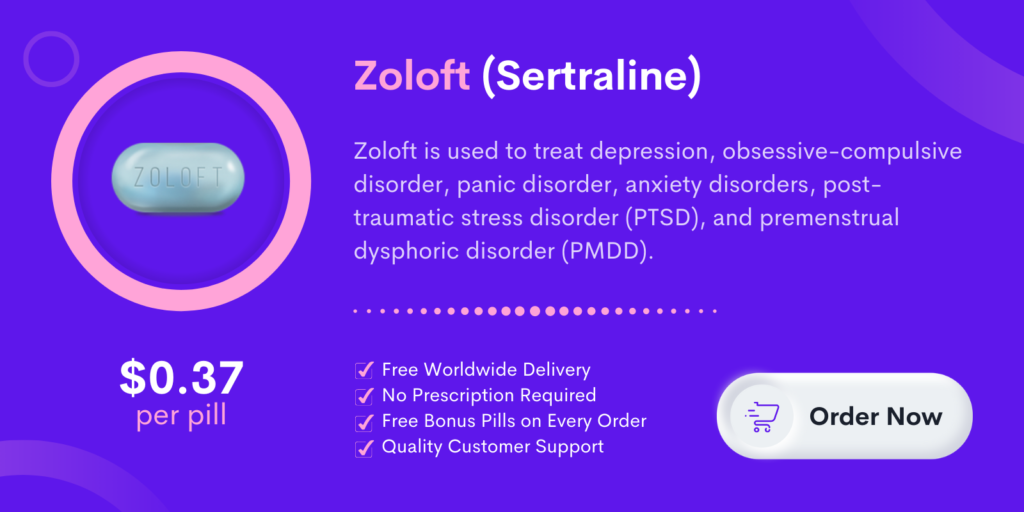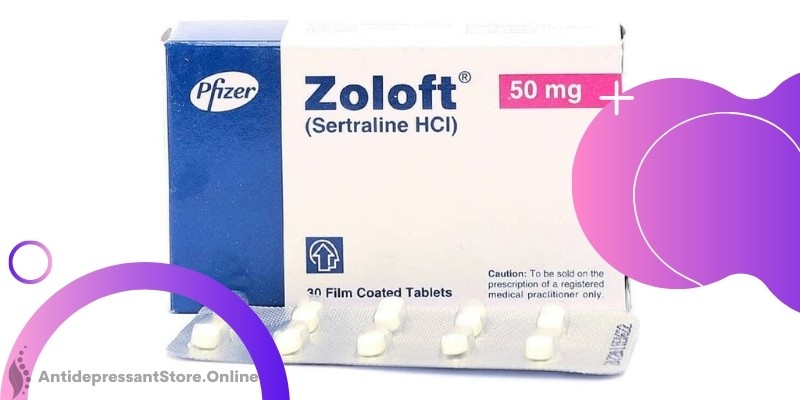Basic facts about Zoloft:
- Comes as 25 mg, 50 mg and 100 mg tablets.
- The active ingredient is Sertraline.
- Helps get rid of depression and certain mental illnesses.
- Belongs to a class of drugs called SSRIs.
Clinical trials show that Zoloft is unlikely to alleviate the depression symptoms within the first four weeks. However, it can improve other clinically important parameters, such life quality, mental health self-assessment and anxiety.
What is Zoloft and what does it treat?
Sertraline is the active ingredient, which was the base of the original Zoloft product. Experimental and clinical evidence suggests that this drug exerts a positive action over the communication between nerve cells in the central nervous system and/or restores chemical balance in the brain.
List of indications:
- Clinical depression
- Social anxiety disorder
- Premenstrual dysphoric disorder
- Posttraumatic stress disorder
- Panic disorder with or without agoraphobia
- Obsessive-compulsive disorder
How and when to take Zoloft?
Early detection, intervention and appropriate treatment of mental illness can reduce emotional stress, prevent relapse and promote remission.
The usual starting dose for men and women is one 25 mg or 50 mg tablet.
The range of therapeutic doses lies in the range of 25-200 mg.
The treatment effect may differ at times. Subsequent single doses should be increased depending on the type of disease and response to treatment.
Important:
- Take doses at regular intervals.
- Titrate the dose in increments of 25-50 mg at intervals of at least one week.
- Take the pills whole (do not split or chew) either after eating or on an empty stomach.
Avoid abrupt discontinuation of pills. When you need to stop the treatment, you should gradually reduce the dose over a period of at least one to two weeks.
Should Zoloft be used for a long time?
Treatment for depression usually lasts at least 6 months to achieve the desired effect and prevent relapses.
Treatment should be continued if the depressive disorder persists or if you’ve had several consecutive episodes of depression. On the psychiatrist’s advice, this antidepressant can be used for several years in a row.
Could Zoloft cause any problems?
You may have mild side effects early on in the treatment. It is important not to stop taking the medication on a regular basis. As a rule, these effects disappear quickly.
Nausea is the most common adverse reaction. Other side effects come from the gastrointestinal tract:
- Xerostomia
- Vomiting
- Constipation
- Digestive issues
- Abdominal discomfort
During treatment, you may also experience:
- Sleepiness during the day
- Sleep with frequent awakenings
- Sexual dysfunction
- Decreased concentration of attention
- Dizziness
- Weakness
- Headache
- Muscle stiffness
- Muscle weakness
Since dizziness, weakness, and other reactions have been reported in clinical trials, patients should know how they respond to Zoloft before driving vehicles or using machinery.


